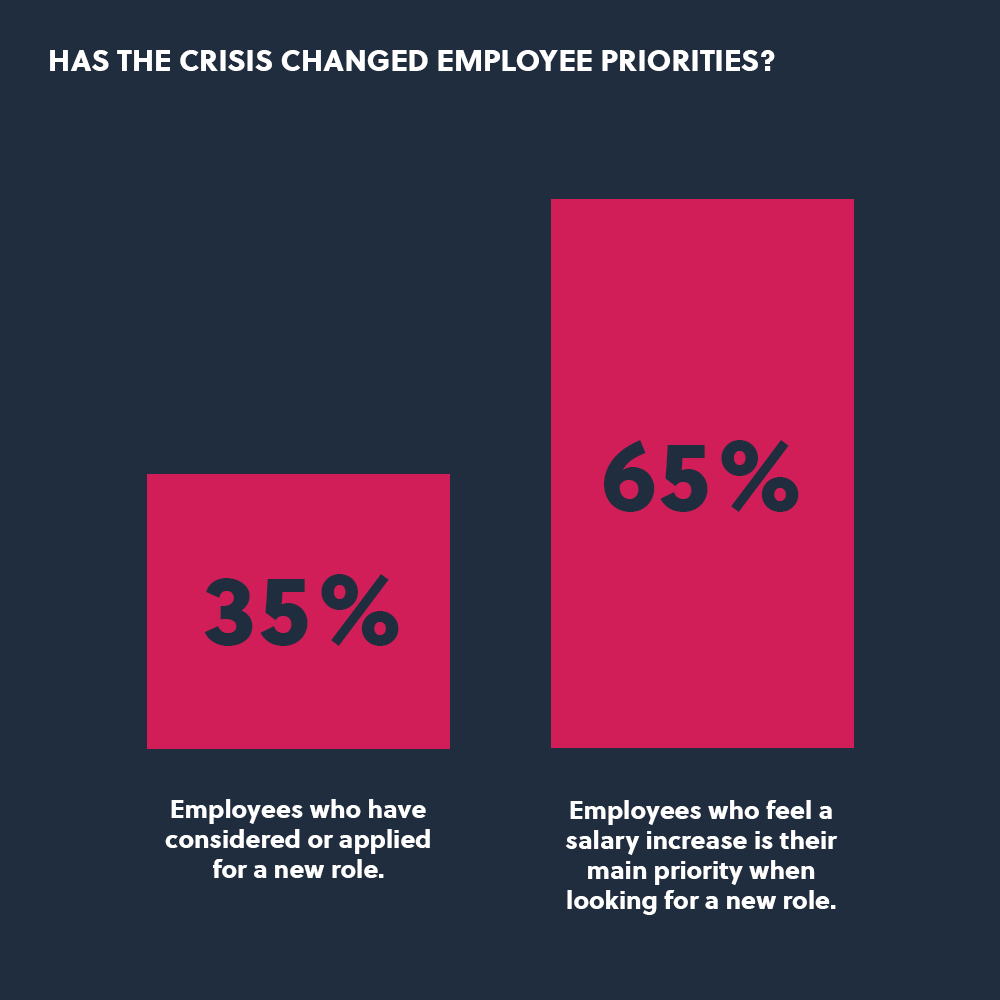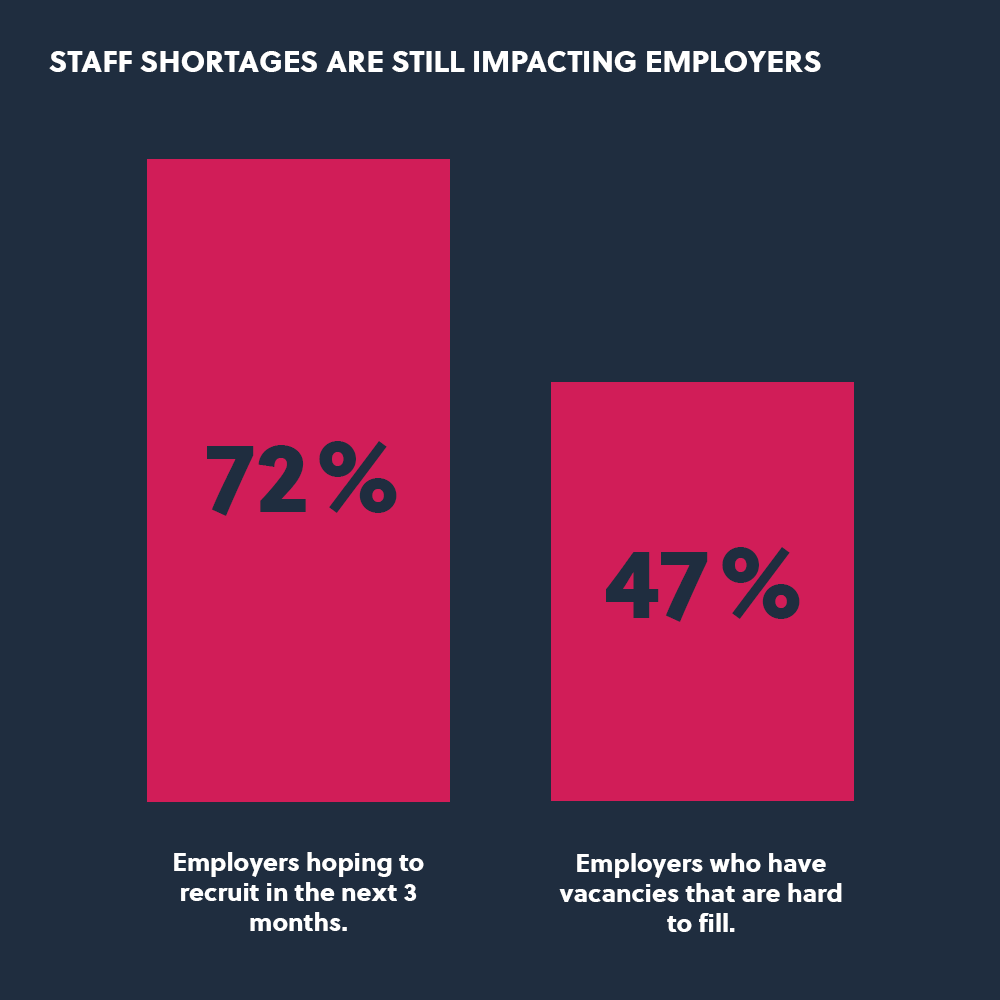The Cost of Living Crisis: Employment Market Impacts Report



As of the 1st of August, inflation in the UK sits at 9.4%, which is the highest level seen since 1982. And it’s not set to stop there: in fact, the Bank of England expects inflation to peak at 13% later this year and to remain ‘very elevated’ throughout much of 2023.
This, coupled with the new Ofgem price cap which means consumers will need to plan for an 80% rise in energy bills from October alongside the rising cost of fuel, food, transportation, and other living costs, has put a very real strain on many. As a result of this, a study this month found that a third of employees have considered or applied for a new job, while 65% now feel a salary increase is their main priority when looking for a new role.
This is indicative of a huge shift in employee and job-seeker psyche: just a handful of months ago back in February, our article analysing the trends that were motivating ‘The Great Reshuffle’ found that work-life balance was valued higher by jobseekers than salary, but this has shifted massively as employees are now prioritising salary over all else in order to survive the crisis.
While everyone is being hit heavily by the soaring cost of living, those within the younger demographic appear to be some of the worst-hit and concerned. A study by Deloitte found that as many as “half of UK Gen Zs and millennials use all their monthly income on living costs, whilst two in five have taken on a side hustle to make ends meet.” Perhaps unsurprisingly then, it is those workers in the 18 to 34 range and 35 to 44 age range who said a salary increase of between £2,500 and £4,900 would encourage them to remain loyal to their current company.
But it’s not just employees who are feeling the pinch: data from the ONS has found that regular wages fell by a record 3% from April to June 2022, as the rates employers were able to pay failed to keep up with soaring inflation. Equally, the APSCO August 2022 Trends Report has found that average permanent salaries have fallen 7% year-on-year, despite July seeing a 10% annual increase in permanent placement numbers.
All of this indicates that companies are struggling to offer salaries that are competitive in the current climate and can keep up with the fast-rising inflation.
Moreover, as the economic and financial crisis escalates, the skills shortage and difficulty to hire haven’t gone anywhere. According to the latest Labour Market Outlook from the CIPD, “although 72% of employers expect to recruit in the next three months, almost half (47%) have vacancies that are hard to fill.”
What is the impact on the market? Our Predictions:
As the market evolves and the climate becomes increasingly unstable, both employers and employees alike should be conscious of the likely impact that the crisis will have on jobs and job-seeking.
Homeworking
It is likely that we could see some changes in attitudes to homeworking: whilst some may be keen to return to the office to work as the price of energy soars and save on heating and lighting as we enter the colder and darker winter months, others might prefer to work entirely remotely in order to save on astronomical commuting costs. Equally, for businesses that have seen a decline in office attendance in recent months, it might be the case that we see these employers seeking to reduce their overheads by choosing to close their offices on certain days, resulting in enforced homeworking. Where possible, employers should remain as flexible as possible to these requests in order to assist their employees in the current climate.
Increase in employee ‘side hustles’
As the struggle to cover living costs escalates, it is becoming increasingly common for employees to take on additional work- or a ‘side hustle’- in order to supplement their full-time salary. Employers need to be prepared for these requests, ensure they are clear on their stance, and review policies and contracts accordingly, all whilst keeping in mind the Working Time Regulations to ensure that employees aren’t exceeding the 48-hour working week limit. These should be reviewed on a case-by-case basis, considering the nature of the side hustle and the responsibilities of the employee within their current role, and how these might interact with each other.
Morale could suffer
As many businesses consider cost-cutting solutions in order to limit their outgoings, such as a reduction in incentives, a rollback in benefits on offer, and even redundancies, it is likely that existing staff morale could take a significant hit. Although some of these might be inevitable, at a time when many employees may be tempted to move roles in order to secure an increase in pay, employers must consider if the knock-on effects of their cost-cutting measures could have a more serious impact on their staff retention in the long term.
Equally, while many businesses worked hard to rebuild and restructure their working cultures post-pandemic, these are in real danger of suffering as the ongoing crisis escalates. As working habits are likely to shift once again, it’s important that businesses don’t forget the importance of maintaining a positive, supportive, and attractive culture alongside all the other considerations they are contending with. Even if salary has overtaken culture in employee priorities, it’s still a huge factor that is likely to impact the attitude of a prospective hire as well as existing employees.
Pay rise requests & another reshuffle?
Naturally, given the current situation, it is inevitable that employees will be looking to cover their costs as best as they can. Employers need to expect requests for salary increases in order to keep up with the rising inflation or expect another great reshuffle. Equally, it’s important to consider those employees who stayed loyal to their company during the ‘great reshuffle’ who never received the post-covid pay rise that those who switched roles gained. Those individuals will now find themselves in an even worse financial situation than those who did find themselves a new role and are most likely to need to find a new role to survive the current crisis.
What can be done to help?
The current picture that is being painted by news outlets, media, and wider social media spheres is undeniably bleak. With astronomical costs for employees and employers alike, both parties may feel like their hands are being tied. But, with all of that being said, there are options available aside from an out-and-out salary increase that could ease the burden of the crisis. People Management suggests that employers should consider other ways that they can help their employees. For example, if an employer cannot afford to commit to a salary increase, they could instead offer ‘one-off payments or tax-free vouchers’, or equally consider offering less costly benefits such as free food in the office or subsidised travel and/or car-share arrangements. Equally, ‘staff could be allowed to sell back unused holiday entitlement (subject to the minimum 5.6 weeks paid annual leave, which cannot be paid in lieu).’ Equally, ‘loans for public transport or salary sacrifice schemes can also be used to efficiently assist with things like childcare vouchers or cycle-to-work programs while sharing the burden between employee and employer.’
As crucial as providing tangible solutions to combat the crisis, however, is the importance of attitude. It’s essential that employers remain cognisant of their staff’s situations in the current climate. Claire Weal, a senior paralegal in the employment law team at Blake Morgan, states: ‘employees with certain protected characteristics may be more affected by the cost-of-living crisis than others. Younger people tend to be on lower wages than older employees, and women are still more likely to be paid less than men. In addition, many people with disabilities are being significantly impacted and may need additional assistance.’
The bottom line is that neither employer nor employee can afford to bury their head in the sand when it comes to the cost of living: the crisis is ongoing, ever-evolving, and it’s not going anywhere.
Employers need to be conscious of this and remain understanding, empathetic, and awake to the struggles that employees are facing and keep lines of communication open, whilst employees must consider their options carefully in the face of economic uncertainty.
Do you have the talent you need to grow?
Find out more about the services and recruitment solutions we offer…